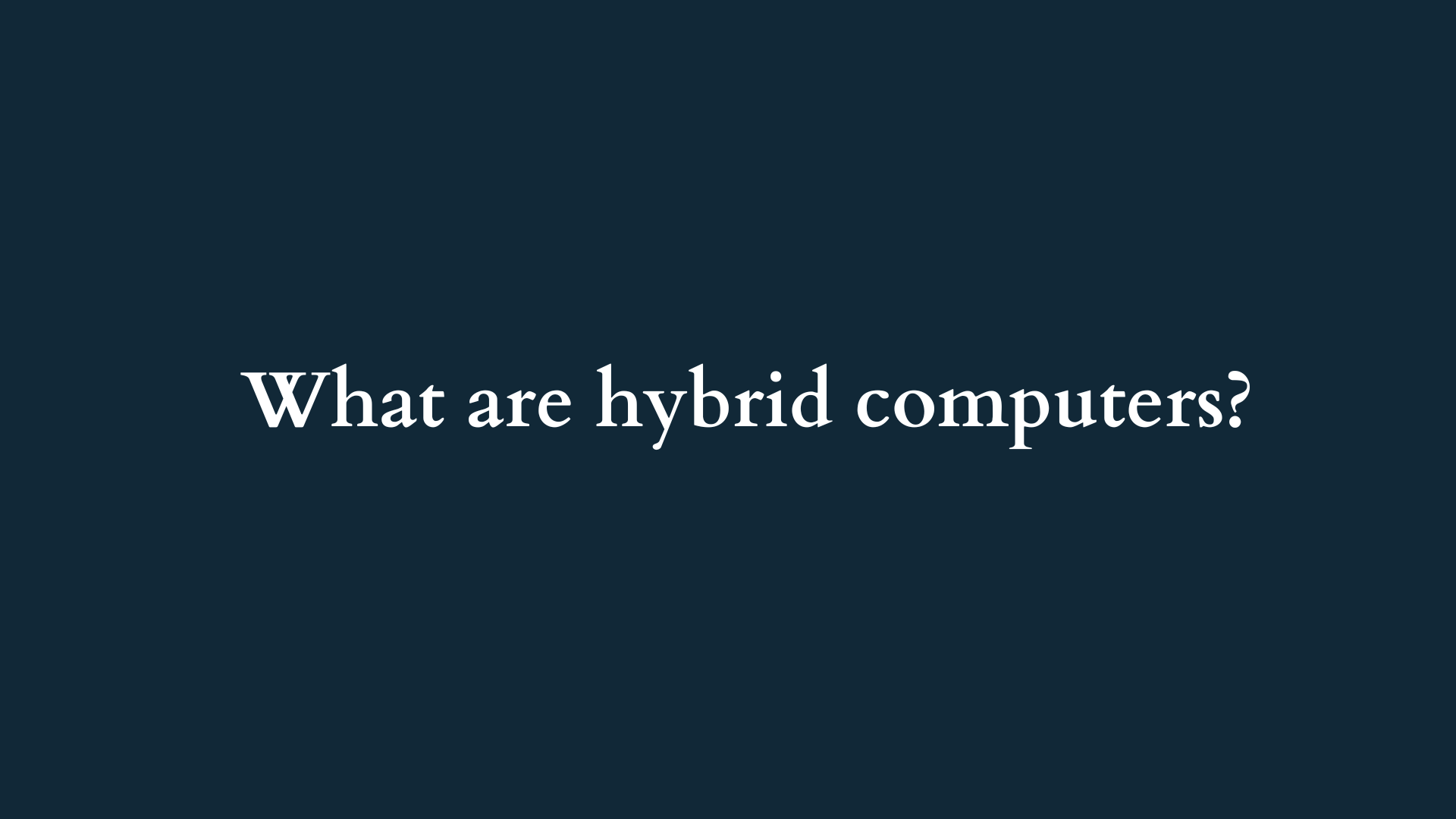Understanding Hybrid Computers: A Seamless Integration of Analog and Digital Technologies
In the rapidly evolving landscape of technology, the delineation between different types of computing systems is becoming increasingly blurred. Among these systems, hybrid computers stand out as a fascinating convergence of analog and digital technologies, merging the best attributes of both to create versatile and efficient computing solutions. This blog post will delve into the fundamental concepts of hybrid computers, their operational mechanisms, applications, benefits, and the challenges they face in today’s technology-driven world.

What Are Hybrid Computers?
Hybrid computers are systems that combine the features of both analog and digital computers. Analog computers excel at processing continuous data, making them particularly effective in scenarios that require real-time simulations or handling complex variable systems. Digital computers, on the other hand, manipulate discrete data and are characterized by their ability to perform logical operations, execute algorithms, and process large datasets.
By integrating both analog and digital components, hybrid computers can harness the advantages of each type. They are particularly effective for applications that involve both continuous data streams and discrete operational tasks, allowing for enhanced precision and efficiency.
Historical Context
The concept of hybrid computing traces its roots back to the mid-20th century. Early hybrid systems were primarily utilized in scientific research and military applications, where the computation of complex equations and simulations was paramount. Notable examples include the use of hybrid systems in the Apollo space missions for trajectory calculations and in various engineering fields for modeling physical phenomena.
As technology advanced, the evolution of microprocessors and integrated circuits catalyzed the development of more sophisticated hybrid computers. The emergence of high-speed digital processors enabled the implementation of complex algorithms while maintaining the continuous data handling capabilities of analog systems.
Operational Mechanisms
At its core, a hybrid computer comprises two main components: the analog processor and the digital processor. The analog processor handles tasks that require the manipulation of continuous data, such as voltage or current levels, while the digital processor executes binary operations related to logic and computation.
1. Analog Component
The analog component operates on real values and can process complex mathematical functions that feature continuous variables. It uses elements such as operational amplifiers, resistors, capacitors, and inductors to represent and manipulate data. This makes analog components particularly suited for simulation tasks such as modeling physical systems, electrical circuits, or dynamics that can be described by differential equations.
2. Digital Component
The digital component manages discrete data in binary form. It executes algorithms, handles large datasets, and performs logical operations through microprocessors or microcontrollers. This component is critical for data storage, retrieval, and high-level computational functions that require precise control, organization, and accuracy.
Data Conversion
An essential function of hybrid computers lies in the conversion of data between analog and digital formats. Analog-to-digital converters (ADCs) and digital-to-analog converters (DACs) facilitate this process. The ADC transforms analog signals into digital formats for processing, while the DAC converts processed digital data back into an analog format when needed.
Applications of Hybrid Computers
Given their unique capabilities, hybrid computers find applications across various business fields:
1. Scientific Research
In fields such as physics and engineering, hybrid computers are indispensable for simulating complex systems. They model dynamic processes, optimize designs, and conduct real-time simulations, particularly in fields that require continuous variable analysis.
2. Control Systems
Hybrid computing plays a crucial role in control systems, such as those utilized in aerospace and automotive industries. Flight simulation and autopilot systems use hybrid technology to process continuous sensor data and execute discrete control commands for navigation and stability.
3. Telecommunications
In telecommunications, hybrid computers manage network traffic, analyze signals, and process user data while also controlling continuous signal processing for broadcasting and reception.
4. Robotics
Robots equipped with hybrid computing systems can effectively balance the need for continuous monitoring of physical variables with discrete decision-making processes, allowing for advanced functionalities in automation, navigation, and interaction.
Benefits of Hybrid Computers
The integration of analog and digital systems yields several key benefits:
- Enhanced Performance: Hybrid computers can execute complex computations more efficiently by leveraging the strengths of both analog and digital components.
- Real-Time Processing: Their design allows for real-time data processing, which is critical in fields like control systems and telecommunications.
- Versatility: They can be adapted to a wide range of applications, making them suitable for diverse industries, including healthcare, aerospace, and manufacturing.
- Data Efficiency: Hybrid systems can handle large amounts of data while maintaining precision in analysis and computation.
Challenges Facing Hybrid Computers
Despite their advantages, hybrid computers face certain challenges:
- Complexity: The architecture and design of hybrid systems can be more complex than their solely analog or digital counterparts, requiring specialized knowledge for development and maintenance.
- Integration Issues: Ensuring seamless integration between analog and digital components can pose significant challenges, particularly in maintaining signal quality during data conversion.
- Cost: The development and implementation of hybrid computing systems may incur higher costs compared to traditional computing systems, which can impact their adoption in certain sectors.
The Future of Hybrid Computing
As technology continues to advance, the potential for hybrid computers to evolve and integrate with emerging technologies is promising. The rise of machine learning and artificial intelligence may further enhance the capabilities of hybrid systems, allowing them to process more complex data and perform sophisticated analyses.
Moreover, as industries increasingly demand greater efficiency and accuracy, hybrid computing can serve as a pivotal solution, ushering in a new era of computational prowess. Whether in research laboratories, production lines, or control rooms, hybrid computers are poised to play a pivotal role in shaping the future of technology.
Conclusion
Hybrid computers represent a fascinating intersection of analog and digital technologies, providing unique solutions to complex computational challenges. While their complexity and integration challenges should not be overlooked, the benefits they offer in real-time processing, versatility, and data efficiency make them indispensable in various applications spanning multiple industries. As we continue to push the boundaries of computing, hybrid computers may very well define the next generation of technological advancements, laying the groundwork for innovation across a multitude of fields.
Shop Now






